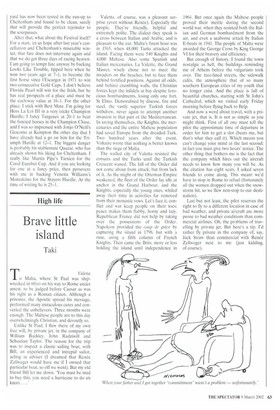Brave little island
Taki
TValetta
o Malta, where St Paul was shipwrecked in 60AD on his way to Rome under arrest, to be judged before Caesar as was his right as a Roman citizen. Although a prisoner, the Apostle spread his message, performed many miraculous cures and converted the unbelievers. Three months were enough. The Maltese people are to this day overwhelmingly Christian, and devoutly so.
Unlike St Paul, I flew there of my own free will, by private jet, in the company of William Buckley, John Radziwill and Sebastian Taylor. The reason for the trip was to inspect a classic sailing boat, with Bill, an experienced and intrepid sailor, acting as adviser (I dreamed that Renee Zellweger would have me if I owned that particular boat, so off we went). But my old friend Bill let me down. 'You must be mad to buy this. you need a hurricane to do six knots ... ' Valetta. of course, was a pleasant surprise (even without Renee). Especially the people. They're friendly, helpful and extremely polite. The dialect they speak is a cross between Italian and Arabic, and is pleasant to the ear. Malta's finest hour was in 1565. when 48,000 Turks attacked the island. Facing them were 540 Knights and 4,000 Maltese. Also some Spanish and Italian mercenaries. La Valette, the Grand Master, wisely chose not to meet the invaders on the beaches, but to face them behind fortified positions. Against all odds, and behind crumbling walls, the Christian forces kept the infidels at bay despite ferocious bombardments, losing only one fort, St Elmo. Demoralised by disease, fire and steel, the vastly superior Turkish forces withdrew, never again to attempt another invasion in that part of the Mediterranean. In saving themselves, the Knights, the mercenaries and the entire Maltese population had saved Europe from the dreaded Turk. Two hundred years after the event, Voltaire wrote that nothing is better known than the siege of Malta.
The walled city of Valetta resisted the corsairs and the Turks until the Turkish Crescent waned. The fall of the Order did not come about from attack, but from lack of it. As the might of the Ottoman Empire weakened, the fleet of the Order lay idly at anchor in the Grand Harbour, and the Knights, especially the young ones, whiled away their time in activities far removed from their monastic vows. Let's face it, conflict and war keep people on their toes; peace makes them flabby, horny and lazy. Republican France did not help by taking over the possessions of the Order. Napoleon provided the coup de grace by capturing the island in 1798, but with a ruse, using a fifth column of French Knights. Then came the Brits, more or less holding the island until independence in 1964. But once again the Maltese people proved their mettle during the second world war, when they resisted both the Italian and German bombardment from the air, and even a seaborne attack by Italian E-boats in 1941. The people of Malta were awarded the George Cross by King George VI for their bravery and efficiency.
But enough of history. I found the town nostalgic as hell, the buildings reminding me of Athens before the vulgarians took over. The tree-lined streets, the sidewalk cafés, the atmosphere that of so many southern European cities of my youth that no longer exist. And the place is full of beautiful churches, starting with St John's Cathedral, which we visited early Friday morning before flying back to Belp.
And now a word about travel, with a private jet, that is. It is not as simple as you might think. First of all one must tell the pilot the approximate time of departure in order for him to get a slot (beats me, but that's what they call it). Which means you can't change your mind at the last second: in fact you must give two hours' notice. The other thing that bothers me is the fact that the company which hires out the aircraft needs to know how many you will be. As the citation has eight seats, I asked seven friends to come along. This meant we'd have to stop in Rome to refuel (fortunately all the women dropped out when the snowstorm hit, so we flew non-stop to our destination).
Last but not least, the pilot reserves the right to fly to a different location in case of bad weather, and private aircraft are more prone to bad weather conditions than commercial airlines. Oh, the problems of travelling by private jet. But here's a tip. I'd rather fly private in the company of, say, Jack Straw than commercial with Renee Zellvy-eger next to me (just kidding, of course).














































































 Previous page
Previous page